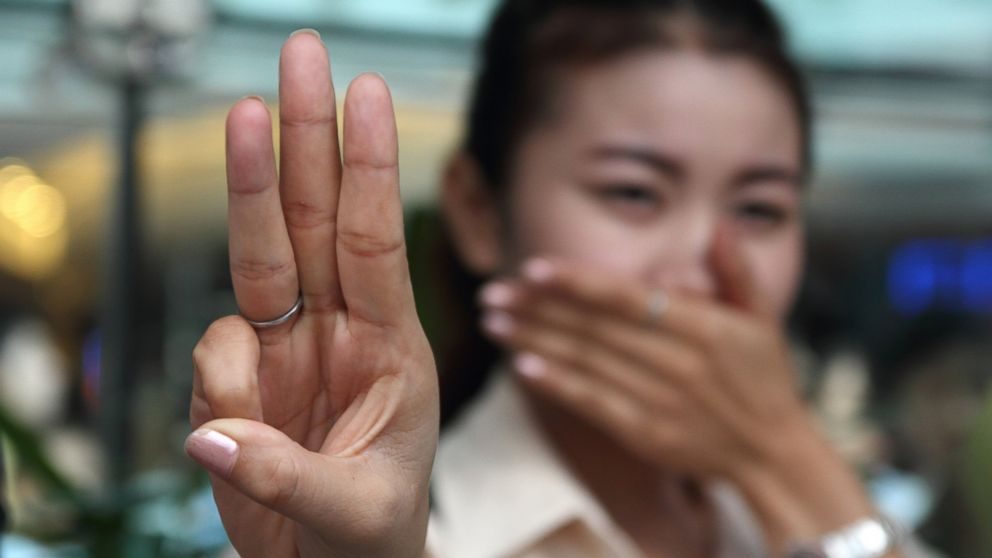The regime of General Prayuth Chan-Ocha is well known internationally for its intolerance of criticism. It began with the summoning of potential dissenters for attitude adjustment. The adjustment techniques include intimidation and verbal and physical abuse. Protesters were arrested and academic forums that might irritate the sensitivity of the coup leader were cancelled. Books were banned and websites were blocked. Even those who petitioned their grievances were forbidden since they were judged disruptive to the unity of the nation. In sum, freedom of expression in Thailand is severely limited.
However, in recent weeks, the junta’s paranoia seems to have reached new heights. People are out in public again showing disapproval of the Prayuth administration and the military is fighting back hard.
Several factors have contributed to the spike in public displays of discontent. Six months have already passed since the coup in May 2014 but Prayuth has failed to deliver on his promises. Most of his policies seem like a degraded version of Prime Minister Yingluck Shinawatra’s, such as the controversial issues of the rice subsidy and railway construction. He has not resuscitated the flailing economy. Nor can he eradicate corruption. Yingluck has not been charged while his own men are tainted with scandals. Even coup supporters have started growing uneasy with Prayuth’s clumsy performance. His trips abroad exposed him as a clown, smiling sheepishly while being ignored by the global community. Meanwhile the arrival of the penultimate Hunger Games movie has revived the three-fingered salute. The most recent blow to the regime is the return to the social media of Somsak Jeamtheerasakul, a critic of the elite establishment who had been absent for six months. Reportedly he is in self-exile abroad after he refused to surrender to the junta.
As a result, there is widespread expression of dissatisfaction, especially among the younger generation. Individuals take selfies of themselves boasting the Hunger Game salute as a symbol of defiance. Five university students made their way before Prayuth to show the salute and their “no coup” shirts. Some of them refused to sign a pledge to abstain from politics. Their detention prompted criticism from media and the general public. University students from various colleges sent open letters demanding more freedom of expression. More surprisingly, farmers from the northeast took a group photo showing the salute to support the younger generation. Leaflets condemning the junta as well as welcoming Somsak Jeamtheerasakul were displayed in several university campuses. Later, a picture of Somsak was displayed at a high-profile high school football match.
The military’s responses have been two-pronged. On one hand, they claim to be democratic soldiers who support freedom of expression. They urge those who wish to express opinions to “play by the rules” by expressing them at designated forums or submitting them to the National Reform Council or the cabinet. However, speakers cannot criticize the government or they will face sanction. Moreover, these forums are so lengthy and complicated that one’s voice can never be heard. Opinions need to be prepared in a formal manner. They will be heard and later left unattended by the authorities. On the other hand, the suppression continues. Soldiers invaded campuses to detain dissenters for “attitude readjustments,” followed by continued harassment. Soldiers and police, both in uniform and plainclothes, have followed them home to record photos and videos of them and their friends. Students were advised to focus on studying instead of political activism. Platoons of police lined up in front of a movie theater ready to arrest anyone who made the Hunger Games salute.
In a land where there are always two versions of truth, the official truth and the real truth, such hypocrisy is not surprising. The junta has tried almost every possible way to quiet the public. The only choice left is to sincerely listen to their complaints. Sadly, this choice has never been considered.
Maintaining the illusory peace is a costly business. This mission consumes most of the state’s attention and resources. The junta engages in daily appeals for obedience while attacking dissenters with the hollow accusation of obstructing the making of a sustainably transparent democratic Thailand. But the more the junta suppresses, the less their already dwindling support will remain. Soon a majority will find these dirty operations unacceptable. Lately, even Amara Pongsapitch, the Chief of the National Human Rights Commission and a supporter of the anti-Thaksin movement, who had previously turned a blind eye to the administration’s transgressions, expressed her objection to arresting college students.
But fewer supporters also mean harsher controls will be required to preserve this fragile regime.
As ridiculous as these abuses may seem, the brutality is real. Unfortunately the military is actually benefiting from such unrest as it provides a justification to extend martial law indefinitely. Thais are stuck with a Catch-22.
Long term, the junta’s intolerance obstructs the path to reconciliation and political reform. Truth is the essential element to reconciliation and to solving Thailand’s chronic problems. Lies, denial, and ignorance only lead to deeper resentment. Without straightforward criticism, the path to reform will wander aimlessly and we will never arrive at the destination. Democracy cannot be built under a regime of suppression, fear, and lies. Prayuth’s two-pronged response to the angry voice of the people only confirms that this coup is a waste and the damage will stay long after the junta leaves office.
Khemthong Tonsakulrungruang is a constitutional law scholar in Thailand
 Facebook
Facebook  Twitter
Twitter  Soundcloud
Soundcloud  Youtube
Youtube  Rss
Rss 